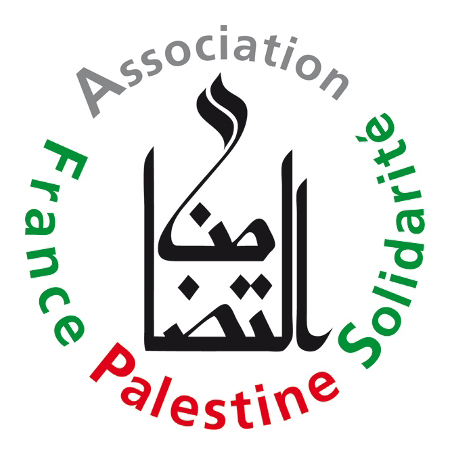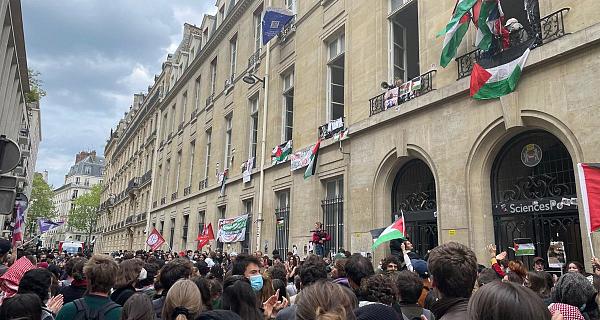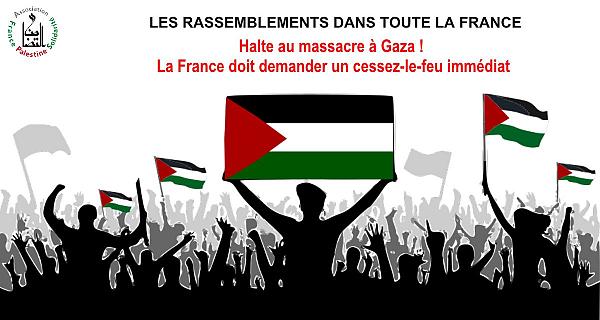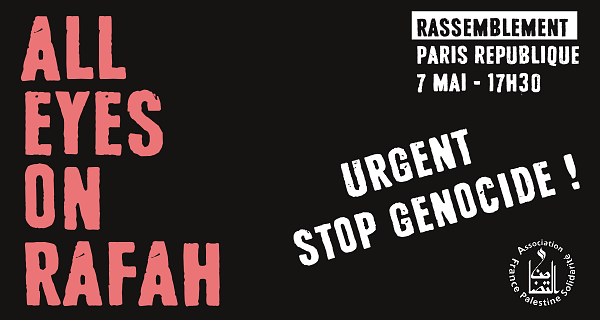During the week of April 8 and before April 12, lawyers from Action Sécurité Éthique Républicaines (ASER), a collective of NGOs representing Attac, Fédération des Tunisiens pour une Citoyenneté des deux Rives (FTCR), Association France Palestine Solidarité (AFPS), Association des Marocains de France (AMF), Comité pour le Respect des Libertés et des Droits de l’Homme en Tunisie (CRLDHT), Union Syndicale Solidaires, and Amnesty International France have filed, or are about to file, three applications for interim injunction before the Paris Administrative Court concerning the arms transfer permits issued by the French authorities to Israel.
Four organizations are also voluntarily intervening in the emergency proceedings launched by ASER (ACAT-France and Stop Fuelling War) and Amnesty International France (Ligue des droits de l’Homme - LDH).
The aim of these three separate legal actions is to ensure that France’s international commitments are respected. There is a clear risk that the weapons and military equipment France exports to Israel will be used to commit serious crimes against civilians in the occupied Gaza Strip. In doing so, France is violating international rules such as the Arms Trade Treaty, and risks becoming complicit in violations of international law - including war crimes - and possible genocide.
Our NGOs emphasize that these legal proceedings are taking place against a background of very serious violations of international humanitarian law, justifying an urgent judicial response. All States parties to the United Nations Convention on the Prevention and Punishment of the Crime of Genocide (1948), including France, have an obligation to prevent the commission of genocide and to refrain from contributing to its commission.
The statements below are the sole responsibility of their authors.
ASER President Benoît Muracciole said: "The French government has an obligation to respect France’s international commitments under Article 6 paragraphs 2&3 of the Arms Trade Treaty, and to suspend any transfer when these weapons or goods could be used to commit genocide, crimes against humanity, war crimes."
Jean-Claude Samouiller, President of Amnesty International France, said: "France cannot ignore the fact that French components could be used in the Gaza Strip as they are assembled into Israeli weapons. Regardless of the quantity and amount of war materiel transferred, France has only one responsibility: to ensure that its arms transfers do not carry a substantial risk of being used to commit or facilitate serious violations of human rights and international humanitarian law."
AFPS President Anne Tuaillon declared: "Acting to stop genocide in progress is not an option, it’s an obligation. And the first obligation is to stop the arms trade with Israel. The legal action to which we are a party is part of the demand we are making of the French authorities."
Yves Rolland, President of ACAT-France: "By selling arms to Israel, France is contributing to the risk of turning its legitimate right to defend itself into genocide. It is urgent to suspend these transfers, in accordance with the Arms Trade Treaty that France has ratified."
Background:
At a time when the ICJ ruled on January 26 that genocide was plausible and established on March 28 that the situation was continuing to deteriorate in the Gaza Strip, with famine no longer just a risk but a reality, France, like all States parties to the Genocide Convention, has an obligation to act to put an end to this situation. This obligation is in addition to those set out in the Arms Trade Treaty, ratified by France, and in the European Union’s Common Position on arms exports.
However, it is becoming increasingly clear, from the government’s responses to the various written and oral questions put to it, that France continues to deliver war materiel to the State of Israel. With the Eurolinks affair revealed by the independent investigative media Disclose, these deliveries of military equipment have come to light.
Our organizations, each with its own history and the logic behind its own legal action, have decided to coordinate their actions and address the French press and public with this joint press release. This is an unprecedented situation, in response to the extreme seriousness of the crimes committed by the Israeli government against the Palestinian people in the Gaza Strip.
Course of action and summary :
– On April 9, 2024, Maître Matteo Bonaglia, acting on behalf of the NGO Action Sécurité Éthique Républicaines (ASER), lodged an urgent appeal with the Paris Administrative Court, in which the associations Acat France and Stop Fuelling War will participate on a voluntary basis. The aim of the interim injunction is to request the suspension of an export license for war materiel in the ML3 category (munitions and munitions components) destined for Israel.
– Maîtres William Bourdon and Vincent Brengarth, acting on behalf of a group of associations and trade unions, brought the case before the Paris Administrative Court under an emergency procedure. The aim of the "référé-liberté" is to request the suspension of all export licenses for war materiel and dual-use goods to Israel.
– Lastly, Maîtres Marion Ogier and Lionel Crusoé, acting on behalf of Amnesty International France, are taking the case to the Paris Administrative Court, again using an emergency procedure in the form of a référé-liberté. The aim is to obtain the suspension of export licenses for war materiel in categories ML5 (fire control equipment) and ML15 (imaging equipment) destined for the State of Israel. The Ligue des droits de l’Homme (LDH) joins in with a voluntary intervention it forms in support of this request.
Background :
The ICJ decision of January 26, 2024 has brought the issue of arms sales to Israel to the forefront of international law. Litigation proceedings have already been initiated in various countries by NGO groups in Denmark and the Netherlands, with success in the latter. On February 5, under pressure from NGOs, the Walloon Region (Belgium) announced the temporary suspension of two powder export licenses to Israel. Spain, Italy and Canada temporarily suspended part of their arms transfers. Internationally, on Friday April 5, the United Nations Human Rights Council officially called for a halt to arms sales to Israel. France abstained from the vote.





